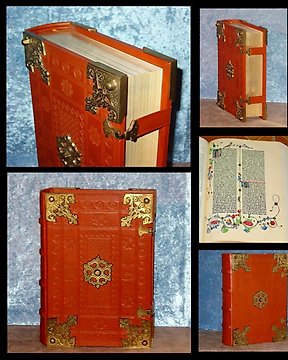
Dr. Martin Luther - Gutenberg Bibel [Fuldaer Einband] - 1450-1991
Nr. 85141821

Nr. 85141821

"The Works of George Bernard Shaw" by George Bernard Shaw - Constable, London - 1930-1938 limited edition of 1025 copies, this being no 795 - complete in 33 volumes - condition: very good, original green cloth, spines slightly toned.
One of the best complete editions of George Bernard Shaw's works, novels, plays
Volume I- Immaturity Volume II- The Irrational Knot Volume III- Love Among The Artists Volume IV- Cashel Byron's Profession Volume V- An Unsocial Socialist Volume VI- Short Stories Scraps & Shavings Volume VII- Plays Pleasant and Unpleasant: The First Volume Volume VIII- Plays Pleasant and Unpleasant: The Second Volume Volume IX- Three Plays For Puritans Volume X- Man and Superman Volume XI- John Bull's Other Island; How He Lied To Her Husband; Major Barbara Volume XII- The Doctor's Dilemma; Getting Married; The Shewing-Up Of Blanco Posnet Volume XIII- Misalliance; The Dark Lady Of The Sonnets; Fanny's First Play Volume XIV- Androcles and The Lion; Overruled; Pygmalion Volume XV- Heartbreak House; Great Catherine; Playlets Of The War Volume XVI- Back To Methuselah Volume XVII- Saint Joan; The Apple Cart Volume XVIII- Translations and Tomfooleries Volume XIX- Major Critical Essays Volume XX- The Intelligent Woman's Guide To Socialism and Capitalism Volume XXI- What I Really Wrote About The War Volume XXII- Doctor's Delusions; Crude Criminology; Sham Education Volume XXIII- Our Theatres In The Nineties (Vol 1. ) Volume XXIV- Our Theatres In The Nineties (Vol 2. ) Volume XXV- Our Theatres In The Nineties (Vol 3. ) Volume XXVI- Music in London (Vol 1. ) Volume XXVII- Music in London (Vol 2. ) Volume XXVIII- Music in London (Vol 3. ) Volume XXIX- Pen Portraits and Reviews Volume XXX- Essays in Fabian Socialism Volume XXXI- Too True To Be Good; Village Wooing; On The Rocks Volume XXXII- The Simpleton of The Unexpected Isles; The Six of Calais; The Millionairess Volume XXXIII- London Music in 1888-89
George Bernard Shaw (26 July 1856 – 2 November 1950), known at his insistence as Bernard Shaw, was an Irish playwright, critic, polemicist and political activist. His influence on Western theatre, culture and politics extended from the 1880s to his death and beyond. He wrote more than sixty plays, including major works such as Man and Superman (1902), Pygmalion (1913) and Saint Joan (1923). With a range incorporating both contemporary satire and historical allegory, Shaw became the leading dramatist of his generation, and in 1925 was awarded the Nobel Prize in Literature.
Born in Dublin, Shaw moved to London in 1876, where he struggled to establish himself as a writer and novelist, and embarked on a rigorous process of self-education. By the mid-1880s he had become a respected theatre and music critic. Following a political awakening, he joined the gradualist Fabian Society and became its most prominent pamphleteer. Shaw had been writing plays for years before his first public success, Arms and the Man in 1894. Influenced by Henrik Ibsen, he sought to introduce a new realism into English-language drama, using his plays as vehicles to disseminate his political, social and religious ideas. By the early twentieth century his reputation as a dramatist was secured with a series of critical and popular successes that included Major Barbara, The Doctor's Dilemma, and Caesar and Cleopatra.
Shaw's expressed views were often contentious; he promoted eugenics and alphabet reform, and opposed vaccination and organised religion. He courted unpopularity by denouncing both sides in the First World War as equally culpable, and although not a republican, castigated British policy on Ireland in the postwar period. These stances had no lasting effect on his standing or productivity as a dramatist; the inter-war years saw a series of often ambitious plays, which achieved varying degrees of popular success. In 1938 he provided the screenplay for a filmed version of Pygmalion for which he received an Academy Award. His appetite for politics and controversy remained undiminished; by the late 1920s, he had largely renounced Fabian Society gradualism, and often wrote and spoke favourably of dictatorships of the right and left—he expressed admiration for both Mussolini and Stalin. In the final decade of his life, he made fewer public statements but continued to write prolifically until shortly before his death, aged ninety-four, having refused all state honours, including the Order of Merit in 1946.
Since Shaw's death scholarly and critical opinion about his works has varied, but he has regularly been rated among British dramatists as second only to Shakespeare; analysts recognise his extensive influence on generations of English-language playwrights. The word Shavian has entered the language as encapsulating Shaw's ideas and his means of expressing them.
So kaufen Sie auf Catawiki
1. Etwas Besonderes entdecken
2. Höchstgebot abgeben
3. Sichere Zahlung durchführen